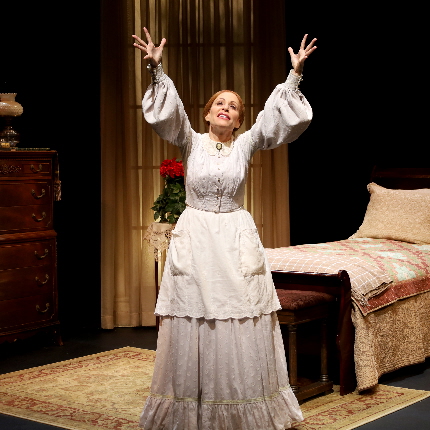
Margery Lowe in Palm Beach Dramaworks’ The Belle of Amherst filmed and presented online.
What Happened, What Is Happening, What May Happen
PART TWO OF FOUR: ONCE MORE UNTO THE BREACH
By Bill Hirschman
And so it began.
At some point, all these experiments online and in parking lots emboldened managers to consider reopening their stages on a scattered basis.
In the fall of 2021, several theaters formally reopened their seasons – pushed by the need and the belief that a hungry audience might be ready to emerge from their closeted cloisters
“I think we were the only ones to produce a full season in 2021,” said Andy Rogow, artistic director of gay-centric Island City Stage in Wilton Manors. “We did it very small. We did small plays with half houses and only eight performances or nine performances… But we did them live.”
Artistic Director Matt Stabile of Theatre Lab in Boca Raton recalls getting an email from the host Florida Atlantic University “allowing the return in May 2021. “I’ve never had like a boilerplate email make me cry. I just kind of wept.”
Empire Stage’s intimate venue in Fort Lauderdale may have been the first with the July premiere of the late playwright Michael Aman’s Off Balance. Theatre Lab opened a family show in September with The Impracticality of Modern-Day Mastodons featuring a large puppet as the title creature. Slow Burn Theatre Company in Fort Lauderdale opened a few weeks later with Jason Robert Brown’s four-performer song cycle Songs For a New World with a single set, a small band and four experienced hands as stand-bys so that a Covid infection would not shut down the show.
IS ANYBODY THERE?: THE AUDIENCE
Turnouts generally were disturbingly disappointing. Theatre Lab, switching to FAU’s 485-seat auditorium to allow distancing, sometimes ended up with only 80 people in the house for Mastodon.
Audiences fell into three different groups, said Island City Stage leaders about their multiple surveys of regular patrons. One group was anxious to return, hungry for the inimitable experience and the excuse to get out of the house. Another group said it would be many months before they felt safe to return. And another said “it depends.”
In some cases, people had paid for tickets, but did not show up in the auditorium, said Sherron Long, founder of the Florida Professional Theatres Association.
Broward County’s director of Broward County Cultural Division Philip Dunlap said, “Anytime you sort of upset status quo like that, there’s a big chunk of folks who are just not going to come back. Either people moved away or they’re still not comfortable or they started using the money and putting it elsewhere….”
Many audience members accepted the on-site precautions for Covid of masking and showing proof of vaccination. But not everyone.
“I didn’t realize that I had this horrible belief in human nature,” Keith Garsson, artistic director of Boca Stage, said. “So, it never occurred to me there would be … a lack of concern for others, selfish, self-centered individuals who do not realize that in a public health situation they are compromising theater’s ability to proceed without issue.”
But as the 2021-2022 season opened sporadically, and later in the year than normal, certain trends were common: Often the size of the opening night crowd was decent if not impressive, including complimentary tickets for long-time patrons and critics. But then the percentages would drop off sharply. Matt Stabile said that for the season as a whole, many theaters he spoke with reported often running at 40 percent of their capacity.
“From what I know, just anecdotally, everybody’s numbers have just tanked,” he said in an interview early last summer. “The people that I have talked to, like, the houses are not there, and if they (were) there, it’s because we’ve given out half of a house of free student tickets or we’ve extended our industry prices into our final weekend… That’s not a flourishing model that’s going to (allow some companies) make it through another two seasons.”
Patrick Fitzwater, Slow Burn’s artistic director, recalled, “I felt like people were going to be a lot more willing to come back. It was exciting to get back, but yet also disappointing and disheartening because you always watch online (and) everybody (says) ‘I can’t wait till theater comes back and I can’t wait for this, or they can’t wait. And then it happened. And I have to be honest, not a lot of people were there.”
Often one show in the season would be an unqualified success attracting patrons such as Frankenstein at Zoetic Stage in Miami. But at other Zoetic titles like the musical Side by Side by Sondheim, some nights the cast of four could have taken on the audience in a street fight, actress Jeni Hacker joked.
Yet, the large budget bio-musical about Gloria Estefan, On Your Feet a year ago cost Actors’ Playhouse an unprecedented $750,000 to mount (nearly twice its largest budget) and cleared about $50,000. With a one-week extension to five weeks, it broke records with more than 13,000 tickets sold, the most in the history of the theater.
But its two earlier shows, Fuacata! and Middletown “did not do the business we should have,” said David Arisco, artistic director. Then post-On Your Feet, the company lost money on the next two shows.
The broader commitment to and belief in “Theater” prompted companies to squint their eyes and look past the immediate scanty houses.
“As a non-profit, the best way to make money is don’t produce theater,” joked Nicholas Richberg, Miami New Drama’s general manager, looking back at the $1.5 million invested in A Wonderful World in December 2021, the world premiere Broadway-bound musical about Louis Armstrong. “But we did a show, and we lost a lot of money” because “the box office was not what we had hoped it would be.”
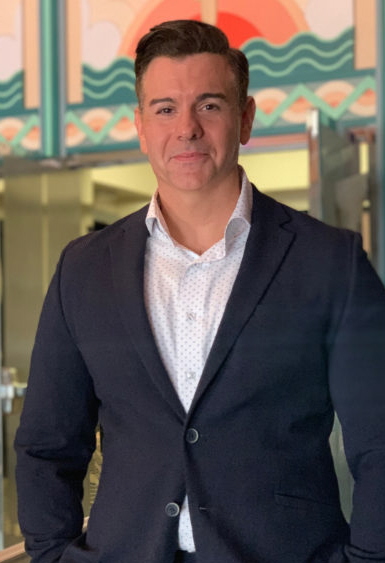
Nicholas Richberg
Its following show, The Cuban Vote “did respectable box office. We gave it two little extensions… and it gave us at least hope that we were turning a corner.”
He added, “But we certainly didn’t come out of the pandemic with the full coffers that lots of other arts institutions did, and we didn’t go into them with the full coffers that other arts institutions did. We’re a young company… that is aggressively trying to grow. We’re always kind of flying close to the sun. That’s also sort of built into the ethos of the company…. We certainly would have been richer had we just gone on vacation for a while.”
Companies responded with a wide range of imaginative discounts, complimentary tickets and deals, as much to kick start people’s theater habits again as to make money.
It had little to do with the quality of the production and ensuing word of mouth: Slow Burn’s Once on This Island in February 2022 was an artistic triumph and uplifting crowd pleaser—except crowds didn’t come. “Once on This Island laid dead on arrival. The audience that were there adored it, and they thought it was amazing, and we’re so happy about it, but they never caught on,” said Patrick Fitzwater. “It just didn’t have a chance. I mean, there was some pathetic (performances) where you’d walk out on stage and be like, oh, my God.”
Island City Stage, with one of the most loyal audiences in the region, was only seeing half houses as it persisted through in 2021, perhaps 35 people in its 69-seat venue and in a cutback number of performances from 20 to eight or nine.
But the 2021 season was much better with productions like Suddenly Last Summer with regular length runs. There was a loss of about 25 percent of the subscribers, but with decent single ticket sales, that the average capacity dropped only from 90 percent pre-Covid to about 85 percent.
And as the summer of 2021 passed, full season renewals became the next measuring stick for audience yearning. Again, different companies had different experiences, but generally, the percentage of renewals noticeably dipped for the 2021-22 season and the pattern repeated itself for the 2022-2023 season at many houses—at best, a bit behind pre-pandemic numbers.
Subscriber numbers at Boca Stage, specializing in serious contemporary drama in an intimate house, are down this season about 25 percent from pre-Covid levels. Maltz Jupiter Theatre, which has had one of the largest subscriber bases in the state, is down about five percent to just under 6,000.
“One of the reasons we went to four-week runs the year prior (to the pandemic) is because our Sunday shows were sold out before we open. And a lot of that was group sales,” said Matt Stabile of Theatre Lab. But when it was to reopen with the family friendly The Impracticality of Modern-Day Mastodons in September 2021, “like, we had one group in particular, and that group, about a month before we opened, (they) called and canceled their entire season.”
Although New City Players in Fort Lauderdale mounted several online experiments, a two-year absence of live on-stage performances posed a problem for the young company. “It almost felt like we were starting over. We had a handful of subscribers, but we lost more than half,” said Tim Davis, producing artistic director.
Broadway Across America presenting tours at the Broward Center in Fort Lauderdale and Arsht Center in Miami is “seeing a very solid renewal rate” for the coming season, President Susie Krasja said. But she noticed a dip in the “older demographic,” which has been a mainstay. “The good news is that we are seeing a younger and more diverse audience member becoming subscribers.”
She added last summer, “Now we have reopened and that we have gotten through this first season back, it is absolutely evident that that relationship is stronger than it has been and that the loyalty is mutual.”
Another dip has been noted in fewer patrons willing to drive far enough to cross county lines.
And with so many questions, the answers are lost in the mist of the future. Theaters are hedging their bets: Actors’ Playhouse will mount a couple of next season’s large scale shows in its 600-seat theater downstairs, but the following season all shows are slated for the 200-seat theater upstairs where they moved Murder on the Orient Express last summer.
“I still think there’s a question out there about whether audiences are going to return in the numbers we had seen prior to Covid,” Andy Rogow said. “Have people gotten too used to sitting at home and watching Netflix? Will it take more of an event-type situation, something that’s really special to make people come out and especially to subscribe? Will we see subscription numbers in the same way?”
Artistic Director Stuart Meltzer told the 42 people in the Zoetic Stage audience at the second night of Mlima’s Tale last December at the Arsht Center in Miami, “It’s been an enormous challenge to get people back.”
Michael Peyton, a longtime donor who sees nearly every production in the region, was the only person along with his wife, Mary Ellen, in the audience at one performance when Main Street Players in Miami Lakes produced Topdog/Underdog last September. He said, “The audiences still aren’t flocking back to the theaters…. I’m still going to shows and the theaters are half empty.”

Michael Spring
Michael Spring, director of the Miami-Dade County Department of Cultural Affairs added last fall, “What I’m hearing is that audiences for indoor performance, theater, music, dance have not completely rebounded yet because those audience members are very well educated, very health oriented in terms of awareness about their health, and very cautious about what they’re willing to do while the pandemic is still going on…. We’re hoping that that will level up as we make our way into the new year and people will continue to grow in confidence and coming back but it hasn’t fully happened yet. So we’re just going to be in a wait and see mode in that regard.”
A ZOOM WITH A VIEW
If the game was changing, one tool became a key game changer. Looming as a possible solution not to mention stopgap was the easy availability of the video experiments on the Internet. Theaters already had been using email and Facebook as inexpensive publicity mechanisms, but very few had experimented with it as an alternative to live performance.
Now it seemed to offer a lifeline to keep their artists and especially patrons assured of a continuing viable commitment. Musical director/actor Michael Ursua raised money for colleagues with online concerts that featured performers singing numbers from a different musical each week.
That led to New City Players creating a five-episode podcast, Little Montgomery, produced remotely from bedrooms and dining rooms, available online and which will be part of the company’s live season this July. It sponsored twice monthly Zoom meetings of between 30 to 50 writers and actors where freshly-penned plays were read by performers. From 200-plus submitted works came a short play festival this past February.
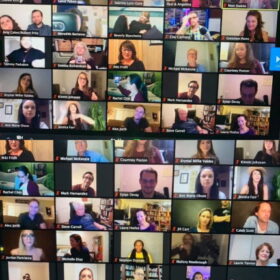 Some companies began hosting online staged readings of plays in progress or plays they wanted to do on stage in the future. While the vibe was encouraging as actors and directors could practice their passion, the hard truth was that many of these outings presented in three-by-three Zoom panes (derisively dubbed The Brady Bunch layout) were unsatisfying both to the viewers and to the performers themselves.
Some companies began hosting online staged readings of plays in progress or plays they wanted to do on stage in the future. While the vibe was encouraging as actors and directors could practice their passion, the hard truth was that many of these outings presented in three-by-three Zoom panes (derisively dubbed The Brady Bunch layout) were unsatisfying both to the viewers and to the performers themselves.
“It’s just miserable because you’re just really reading on your computer into the camera. You’re not even looking at the people you’re reading with because you’re reading your script. And it’s just not acting” with no feedback, no connection with the actors or audience, actress Beth Dimon reported. “I thought by the time I finished my last Zoom, I thought, please, I don’t want to do them anymore. Although it did allow us to get a paycheck.”
But the experiments became more sophisticated as participants’ online and video skills grew. MNM Theatre Company in Palm Beach County built a full set, pre-recorded a score and filmed two live performances of the Maltby and Shire revue Closer Than Ever in November 2020 with notably flexible and professional cinematography and editing by Cliff Burgess, but no live audience.
Then, a few theaters like Island City Stage in Wilton Manors agreed to film most of their freshly resumed live productions in 2020 and 2021. They offered them as an alternative for pay for patrons too nervous about being in a closed space even with masks and vaccination records required.
Producing Artistic Director Bari Newport said the point of GableStage in Coral Gables doing the same thing was “it does serve a certain population of people who are not able to come, not necessarily because of distance, but because they (are ill) and they always used to come.” They streamed to about 200 customers for each of its five shows last season and continue to do so.
The idea crested in February 2021 when Palm Beach Dramaworks filmed a three-camera production of The Belle of Amherst with a full lush set, costuming and lighting which it would remount for a live audience in the coming live season.
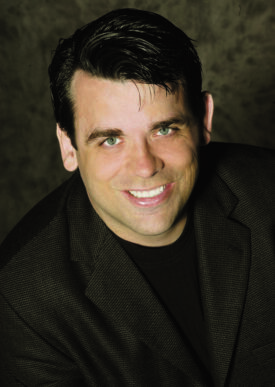
William Hayes
Artistic Director William Hayes has long argued that this paradigm offers a long-term additional option for the future. The National Theatre of Great Britain and Shakespeare Festival in Canada have succeeded financially for more than a decade with sophisticated complex covers of their live productions.
A few like Hayes believe there is a future for fully-staged video theater. He foresees a group of regional theaters producing such works and offering them together on a subscription pay-to-see website so that his Florida work might be subscribed to by a theater fan in Oregon.
But several colleagues, some of whom tried various experiments, felt learning the necessary skill set and the added expense of filming and distributing outweighed the effort invested. The reaction of audience and cyber-ticket requests during the pandemic was lukewarm, most companies reported. It did maintain connections with patrons, but online ticket sales never covered the production costs, and, of course, could not compare with the vibrance of a live performance.
“It is not going to bring in new audiences,” said Andy Rogow. “It is not going to get regular audiences from another region…. It’s not the theater experience. If people want theater, they want it live. You want to go to a movie, you go to a movie.”
On the other hand, most companies significantly ratcheted up the use of the Internet for marketing. Slow Burn Theatre Company now posts nearly daily photos and bios of individuals cast members in upcoming shows, and several theaters have invested in slickly photographed and edited teasers for YouTube and Facebook.
But even that was not a panacea. “We do all this fun stuff, and we get really good engagement online, and we rarely see it translate into actual in person ticket sales,” Stabile said. “I give the example of (the drama) Harlowe. That (marketing) video was insane with the amount of views it got. But I didn’t see people show up to the theater in insane amounts.”
While the frequency of these local video productions has ebbed as live theater returned, Spring contends, “I don’t think it’s going to completely go away as we transition back in person. I think it’s just going to be a way for arts organizations to complement what is clearly the preferred mode, which is live in person performances.”
ONE DAY MORE: STARTING THE COMEBACK
Despite it all, crowds began to return slowly, engendering hope.
But “daunting” hardly covered plans for a resurrection.
“It has been a series of ever-changing puzzles that have more pieces than you ever even know when you first look at it,” said Bari Newport. “And every time you put one together, you’re like, okay, I made it to a new level. It’s like a video game, but then there’s a bigger one over to the side and you’re not even sure if you first think that you’re moving forward, but then you thought, maybe I’m moving sideways. Is there an end?”
Still, undeniable progress was being made. And then in late 2021, the Omicron variant struck and set a lot of calculations—and hopes—back to zero.
“We definitely ran into some roadblocks when Omicron hit, and we lost some performances, we lost some runs across the country,” Susie Krasja said.” We made sure everybody was safe. Nobody went on if they tested the positive, and the producers made sure that there were a bunch of other actors to go on so that the shows wouldn’t have to lose as many performances.”
Sales had been encouraging for Slow Burn’s Kinky Boots in December 2021. “Sales were tracking pretty good. Not as good as they used to be, but not horrible,” Patrick Fitzwater said. “But then Omicron hit the second week of our show and we started losing people.”
Coping with illness, fiscal loss and empty seats was profoundly unnerving, he said. “Usually when you’re doing a show, you don’t want it to end and you’re sad because you only have three more (performances). And this was, ‘Oh, my God, get us to three more performances so we can get out of here alive.’ And so every night that you went on stage, you didn’t know if it was the last performance….. Tomorrow definitely is not promised…. So you just live in this constant state of fear.”
Performers kept getting ill, shutting down rehearsals and performances.
“During a time of a lot of optimism, everybody thought things were going to go back to normal really quickly,” Nicholas Richberg said, “And we planned A Wonderful World (the world premiere musical about Louis Armstrong), which is a very big production, a lot of moving parts, and nobody anticipated Omicron.”
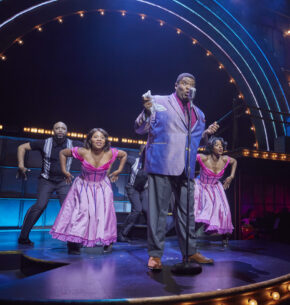
A Wonderful World
On opening night, one of the four (original) women principals was out. “If I remember right, we didn’t really have the full cast on until, I think the fourth week of the run.…and that was after we had a ten-day shutdown, during which, of course, we kept everyone on payroll. And so you can imagine how wonderful that is for the bottom line—not.”
Despite every precaution, GableStage’s comedy Boca Bound lost actor after actor with Newport and eventually even the visiting playwright Jessica Provenz stepping in to play parts. Finally, Newport had to cancel nine performances, refunding tickets. She personally called patrons to explain, but she worried, “Are we losing trust from people because they don’t fully understand all the repercussions of that, that it’s not an entertainment venue, it’s not a venue at all. It is a company of artists who make plays together.”
The new season proved far different logistically from the old, besides dealing with Covid directly. Problems began to stack up. Virtually everything cost more than had been budgeted two years earlier. Even the supply chain headaches were significant. Slow Burn’s need for 140 wigs for Kinky Boots went awry because the chief supplier was Covid-shuttered China.
Some of the costumes Actors’ Playhouse used for the title character in Hank Williams: Lost Highway in July weren’t the ones they ordered. “If you have to buy or go shopping, there’s nothing on the shelves, there’s nothing in stock, and there’s nothing comes on time, and there’s the price of lumber and the price of paint,” David Arisco said.
And yet, plans chugged along. Until a few years ago, summers were a slow time on theater schedules. But in recent years, South Florida theater seasons began earlier and ran longer until summers were only slightly less busy, although the fare was noticeably lighter. With the 2021-22 season having started later, the summer of 2022 was almost as busy as it was pre-Covid.
Problems like supply chains and a brain drain of talent were joined by severe frustration with the unions.
For decades, the theater professionals’ knights in shining armor have been the unions like Actors’ Equity Association and IATSE protecting the rights, safety and minimum income of its members.
But today, the word “Equity” is sometimes spoken like an epithet, not just by producers and directors who are even more critical than usual, but even by some of its own members which now total of 585 in South Florida and 903 in Central Florida.
“Actors fucking Equity is the biggest villain in this entire shit show,” said Keith Garsson. “To quote one of my Equity actors, no one has done more to create less work than their own union.”
At the height of the pandemic, Equity would not give its required blessing for each individual production unless the producing company agreed to extensive and expensive safety measures at a time when many theaters were financially struggling. Repeatedly, national Equity leaders have strenuously insisted their sole concern is protecting members from the illness and from company managers unwilling to take such steps.
But company leaders trying to reopen blasted the union’s sluggishness in developing standards for dealing with Covid in the early months, then its prolonged deliberateness in re-evaluating the stringency of the requirements when the intensity of the virus ebbed, and then still later from companies wanting blessings when trying to use union members in video and other out-of-the-box experiments.
One result is that some artistic directors and producers quietly leaned toward hiring fewer union members or none at all for the 2022-2023 and 2023-2024 seasons. Indeed, one high-profile local actress quietly abandoned her long-term membership in order to work some opportunities just in the past year. Another result is that some musicals with large casts were postponed because of the associated costs for Equity protection—and the danger that if a single key actor gets sick, the production must shutter mid-run unless the company has added the extra expense of hiring understudies.
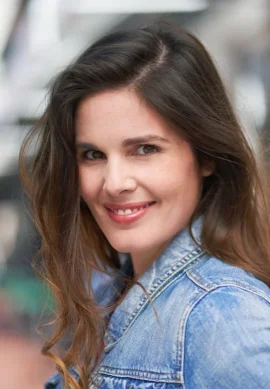
Gaby Tortoledo
Yet many members do value and appreciate the union’s protection. Actress Gaby Tortoledo has recently joined. “The non-Equity world is a very nerve-wracking scene because when there’s no union rule, a lot of the producers will choose to again cut corners. And I went through periods of feeling unsafe because of the way that was being handled.”
Some of the uncontestable rules were reasonable. For instance, everyone, anyone with contact with actors had to be tested three times a week from initial brainstorming to tearing down the set. Anyone with a positive test, from the lead actress to the light board operator, was banned for at least five days. Detailed safety plans had to be reported down to upgrading of air handling systems and filters.
But “somebody would get their safety plan in place” and Equity would change the rules, Sherron Long said.
Another complaint: Those rules applied to all of Equity’s members whether they are appearing on Broadway or in a storefront in Boca Raton. Some local leaders argued that regional theaters work in a different reality. For instance, where a Broadway actor goes home and sleeps during the day; local actors have a second job where there is no masking or precautions. Ironically, several Broadway shows lost performances, even weeks as obedient actors and musicians took ill.
But in recent months, Equity eased requirements for Broadway shows. Then in late October, Equity lifted all specific bullet item Covid protection requirements for regional theaters, saying companies using Equity members must now simply provide a detailed safety plan of their own devising, fitting their own situation and covering all safety facets including health, said Communications Director David Levy. The plans are reviewed, but there are no specific standards to be met. Conversely, the level of detail describing measures being proposed are expected to be extensive.
But that was hardly the most troubling problems. Coming out of the shadows were major issues: sexual improprieties, pernicious working conditions and examples of inherent racism. We examine them in the next part.
(On Wednesday, Feb. 15, Part 3: “Attention Must Be Paid: Racism, Sexism, Working Conditions”)
No look at these subjects can be comprehensive or reflect all the possible insights. We are very interested in your reaction to these articles. If you agree, if you want to challenge something, please feel encouraged to post a comment below or on the Facebook page for Florida Theater On Stage.
WHO WE SPOKE WITH
Many actors, artistic directors, playwrights, patrons and critics spoke candidly on the record and not-for-attribution about what happened over the past three years and what they believe will happen. Thirty-eight people were interviewed in formal interviews and a score provided information and insights in informal conversations on opening nights, in emails, phone calls, Facebook exchanges and other venues.
Among those interviewed (not the complete list): Irene Adjan, actress and vice-chair of the Liaison Committee of Actors Equity Association; Eric Alsford, musical director; David Arisco, artistic director of Actors’ Playhouse at the Miracle Theatre; Andie Arthur, executive director of the South Florida Theatre League; Sue Ellen Beryl, managing director, Palm Beach Dramaworks; Martin Childers, managing director, Island City Stage; Matt Corey, sound designer; Tim Davis, producing artistic director of New City Players; Elizabeth Dimon, actress; Phillip Dunlap, director, Broward County Cultural Division; Caryl Fantel, music director; Roy Fantel, percussionist; Patrick Fitzwater, artistic director, Slow Burn Theatre Company; Patti Gardner, actress; Diana Garle; Keith Garsson, artistic director, Boca Stage; Jeni Hacker, actress-intimacy coordinator; Carey Brianna Hart, actress-director-stage manager and president of the South Florida Theatre League; William Hayes, artistic director and co-founder, Palm Beach Dramaworks; Andrew Kato, Maltz Jupiter Theatre’s producing artistic director/chief executive; Susie Krajsa, president of Broadway Across America; Wayne LeGette, actor-voice performer; David Levy, communications director, Actors Equity Association; Sharron Long, Florida Professional Theatres Association; Darius J. Manuel, educator-actor; Damien J. Matherson, founder, Measure for Measure; Sean McClelland, scenic designer; Bari Newport, producing artistic director, GableStage; Michael Peyton, patron and donor; Elizabeth Price, actress-director-educator and associate artistic director of New City Players; Nicholas Richberg, managing director, Miami New Drama; Andy Rogow, artistic director, Island City Stage; Kelley Shanley, president and CEO of the Broward Center; Geoffrey Short, president of the board the Pembroke Pines Theatre of the Performing Arts and secretary of the Carbonell Awards; Michael Spring, director of the Miami-Dade County Department of Cultural Affairs; Matt Stabile, artistic director at Theatre Lab in Boca Raton; Karen Stephens, actress-director; Sandi Stock, actor and managing director of the Silver Palm Awards; Emily Tarallo, dancer-actress-choreographer; Gaby Tortoledo, actress; and many others. And a hat tip to Hap Erstein and Lou Harry.









 A PaperStreet Web Design
A PaperStreet Web Design
